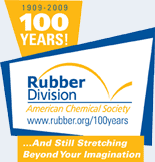![[ Visit ACS Rubber Website ]](images/logo.jpg) |
|
Centennial Elite SponsorsBecome a Centennial Elite Sponsor |
17 Continuous production of elastomer compounds on corotating twin-screw extrudersTuesday, October 13, 2009: 8:00 AM
327 (David L. Lawrence Convention Center )
For more than fifty years, the co-rotating twin-screw extruder has been used for continuous processing
and mixture of highly viscous products. Thermoplastic polymers, including thermoplastic synthetic elastomeres, are its most important application. Through its modular construction and various degrees of freedom within the process configuration, the twin-screw extruder can be well adapted to different processing tasks. The technical reliability and the high economic efficiency in its classical operational areas led quite early to considerations, to also use the twin-screw extruder for the continuous production of elastomer compounds. These are traditionally produced discontinuously on internal mixer. Scientific investigations in laboratories prove that it is basically possible to produce elastomer compounds on twin-screw extruders, capable of cross linking. Furthermore first positive experiences with industrial standards have already been made. Basically the main advantages of continuous compared to the discontinuous mixing process, lie in the steady operating method, which leads to a constant product quality and a constant low power demand. The quality of a continuous mixing process decisively depends on the accuracy of feeding the raw materials. Most additives are available as a well free-flowing bulk materials or as a liquids and can be easily fed to the mixing process with help of commercially available gravimetric solid metering units and pumps. In contrast, dosing of rubber often causes difficulties. Granular elastomeres often is expensive and tends to agglomeration. Meanwhile, a system consisting of a single-screw extruder and a gear pump has been developed that is able to convey reliably and inexpensively roughly chopped bale rubber or rubber slabs into the twin-screw extruders. Therefore, good conditions exist to use the continuous mixing process economically effective on co-rotating twin-screw extruder in the rubber industry. |









